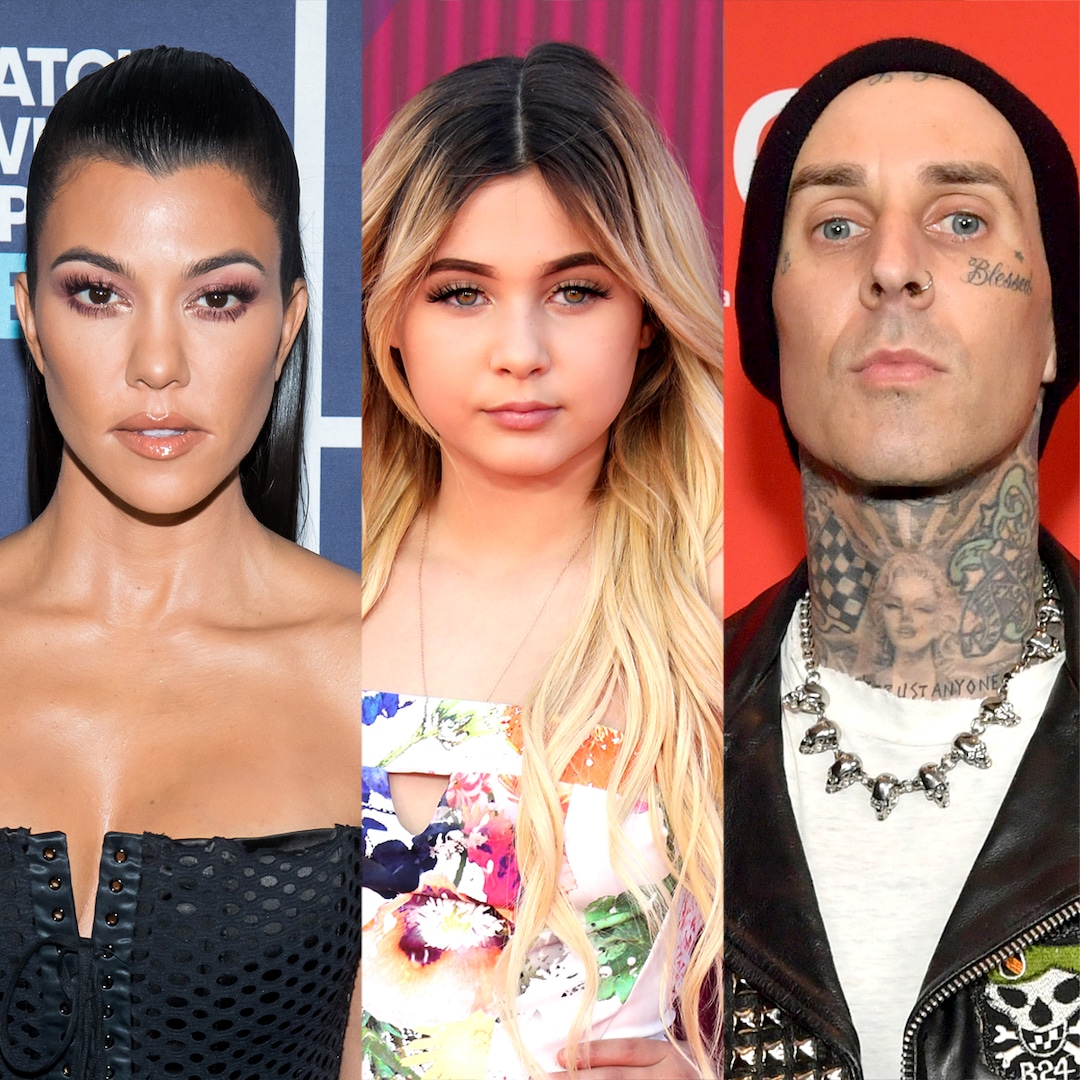The Weight of Fame: Alabama Barker’s Struggle with Body Image and Public Scrutiny
In the age of social media, the pressures on young celebrities are immense. Alabama Barker, the 18-year-old daughter of Blink-182 drummer Travis Barker and stepdaughter of Kourtney Kardashian, is no stranger to the relentless scrutiny of the public eye. Her recent revelations about her struggles with body image, exacerbated by online bullying and paparazzi harassment, shed light on the darker side of fame.

Alabama recently took to social media to share her experiences and the toll they have taken on her mental health. “I’m on weight loss medication because I’m tired of being fat and photographing like a damn ogre,” she confessed. This poignant admission highlights the harsh reality of living under constant public observation, where every unflattering photo and negative comment can deeply affect one’s self-esteem.
The influence of the Kardashian family, known for their beauty standards and social media presence, has not made things easier for Alabama. Critics argue that the family’s lifestyle and the expectations it sets may contribute to Alabama’s insecurities. However, it is essential to recognize that Alabama is not just another social media personality but a young woman navigating the complexities of adolescence and fame.
Alabama’s struggle with body image is further complicated by health issues. She revealed that she has a thyroid problem and an autoimmune disease, both of which contribute to her weight fluctuations. Despite these challenges, the relentless criticism she faces online pushes her towards extreme measures to fit into society’s narrow standards of beauty.
The impact of social media on young girls cannot be overstated. Platforms like Instagram and TikTok, where Alabama has a significant following, often perpetuate unrealistic beauty standards. Teenagers like Alabama are exposed to a constant stream of edited images and highlight reels, which can distort their perception of normalcy and self-worth. Alabama’s candid posts about her experiences serve as a reminder of the toxic environment that social media can create.

Travis Barker, Alabama’s father, has faced criticism for his parenting style, particularly regarding his daughter’s social media presence. Despite his rockstar image, many expect him to impose stricter guidelines on Alabama’s online activities. However, the reality is that Alabama, like many teenagers, seeks to express herself and navigate her identity through these platforms. The balance between allowing self-expression and protecting her from online harm is delicate and challenging to maintain.
Alabama’s journey is a stark reminder of the broader issue of body shaming and its impact on mental health. The negative comments and paparazzi photos she endures are not just isolated incidents but part of a larger culture that values appearance over well-being. This culture affects not only celebrities but also countless young people who look up to them.
In her posts, Alabama addresses the issue head-on, urging people to consider the mental toll of their words. “It’s never okay to body shame or talk about people’s looks in general,” she wrote. Her message is clear: the pain caused by such comments is real and damaging. She emphasizes that the unrealistic standards set by social media are unattainable and harmful, especially for young girls.
As Alabama continues to grow and navigate her place in the world, her experiences highlight the urgent need for a shift in how society treats young women in the spotlight. It’s crucial to foster an environment that prioritizes mental health and self-acceptance over superficial judgments.
Alabama Barker’s story is not just about a young girl dealing with fame; it’s a call to action. It urges us to reconsider the standards we impose on others and the impact of our words. By supporting one another and promoting a culture of kindness and understanding, we can help alleviate the pressures faced by young people like Alabama. In doing so, we can create a world where everyone, regardless of their appearance, feels valued and accepted.
News
(B) Travis Barker MISSED when Kourtney Kardashian returned home drunk after Kardashians party. (VIDEO)…
Courtney Kardashian made headlines just seven weeks after giving birth when she decided to attend the annual Kardashian Jenner Christmas party sans pants. Despite recently welcoming her fourth child, Rocky, with boyfriend Travis Barker, Courtney seemed anything but tired as…
(B) Kourtney Kardashian Shocking Revelation on Why Her Relationship with Travis Barker Ended. (VIDEO)…
In the public eye, Travis Barker and Courtney Kardashian’s relationship was once perceived as an unbreakable union, filled with passion and devotion. However, recent revelations paint a vastly different picture, revealing the underlying turmoil that ultimately led to its demise….
(B) Kourtney Kardashian SECRET XTAPE With Minor Justin Bieber REVIEWED by The Feds. (VIDEO)
The recent discovery of a video purportedly featuring Courtney Kardashian and Justin Bieber has ignited a firestorm within the entertainment industry, prompting intense speculation about its potential ramifications. This revelation, coupled with reports of a raid on Diddy’s home, has…
(B) EXTREMELY SHOCKING: Kris Jenner Lied About DNA Test To Khloe Kardashian As O.J. Simpson Could Be Her Father. (VIDEO)..
In a moment etched into the memories of internet users, Chris Jenner once orchestrated a dramatic DNA test to dispel rumors surrounding Khloe Kardashian’s paternity. Speculations swirled, stemming from Jenner’s revelations in her memoir “Chris Jenner and All Things Kardashian,”…
(B) Kourtney Kardashian finally shows proof her son Reign Disick is actually Justin Bieber’s son. (VIDEO)..
Courtney Kardashian recently embarked on an exciting escapade to Australia and New Zealand with her husband, Travis Barker, for his tour. However, it was their youngest son, Rain, who stole the spotlight during their adventures. With his mischievous antics and…
(B) NEWS HOT; Travis Barker Found Evidence of Kourtney Shared Baby With Justin Bieber (video)…
The rumor mill surrounding Justin Bieber and the Kardashian family has been churning for quite some time, igniting speculation about his connections with various members. While the details are murky and often sensationalized, let’s delve into the complexities of these…
End of content
No more pages to load











